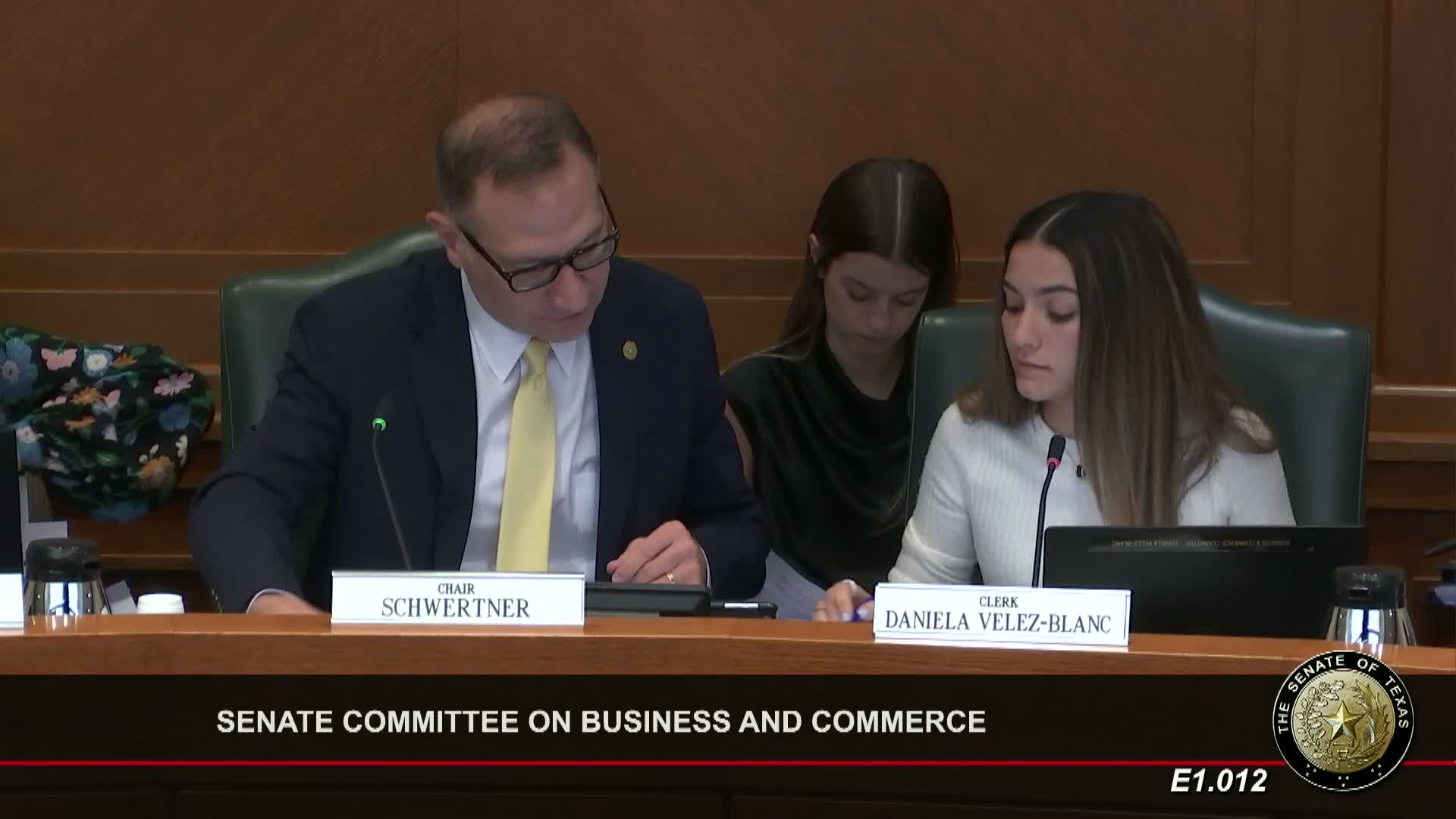Senate committee hears hours of testimony on bill that would bar retail sale of dogs and cats
Get AI-powered insights, summaries, and transcripts
Subscribe
Summary
Senate Committee on Business & Commerce heard extensive testimony for and against Senate Bill 16 52, which would prohibit retail pet stores from selling dogs and cats and create civil penalties; the committee left the measure pending after public comment.
Senate Committee on Business & Commerce members heard more than three hours of public testimony on Senate Bill 16 52, a proposal that would prohibit retail pet stores from selling dogs and cats and establish civil penalties for violations. Supporters, including animal-welfare groups and several city animal-services officials, told the committee the bill would shut a pipeline that brings animals from large commercial breeders into stores and, they said, into taxpayer-funded shelters. Opponents — independent and franchised pet-store owners and trade groups — said the bill would punish legitimate Texas businesses, limit consumer choice and push buyers to unregulated online or backyard sources.
The bill matters because, supporters said, thousands of Texas consumers report buying sick or misrepresented puppies from stores; opponents said stronger regulation, not a ban, is the better fix. Proponents noted local ordinances such as San Antonio’s 2020 restriction and a 2023 state breeder licensing program; opponents pointed to earlier compromise legislation they said already improves sourcing transparency.
Senator (sponsor information not specified in transcript) described the committee substitute as narrowing the measure’s scope and adjusting dates. Under the committee substitute explained in the hearing, the bill would: prohibit retail sales of dogs and cats by retail pet stores after the bill’s effective date; allow pet stores to host rescue organizations or government animal-services entities for adoption displays provided the store receives no fee for the space; create a civil penalty mechanism (testimony described a $500-per-day penalty in one bill summary); and authorize enforcement by the attorney general. A committee substitute would also change the effective date to Sept. 1, 2026, clarify that only sales after the effective date are covered, and bar rescue organizations from sharing staff, premises or affiliations with breeders or brokers to prevent conflicts of interest.
During public testimony, individuals and organizations described the bill’s real-world effects. Simon Zuberce, an electrical contractor who said his family’s puppy required surgery, told the panel: “I spent $20,000 to save this dog's life.” Ashley Morgan, an attorney and former chair of the animal-law section of the State Bar of Texas, said warranties and sales contracts supplied by some retail sellers limit consumer remedies and cited high financing rates in sample contracts, calling them “almost usurious.”
City officials and animal-services leaders backed the bill. Brad Davenport, assistant director of the City of San Antonio’s Animal Care Services, said his city had voted in 2020 to prohibit sales of commercially raised puppies in city limits and that stores simply relocated outside the city; he said state action would prevent the “move-a-few-miles-away” effect that undermines local ordinances. Jamie Cantrell, president of the Texas Animal Control Association, said the current regulatory regime funnels sick animals to already underfunded shelters and that regulators such as the USDA have not fully corrected breeding-facility violations cited in federal inspections.
Retailers and industry representatives — including owners of family-run stores, kennel managers and franchised store operators — urged the committee to oppose the ban and to pursue stronger inspections and transparency instead. Jaime Truba, a multi-store owner, said sales of supplies and services sustain small independent stores and that banning sales would imperil family investments and local jobs. Several witnesses, including owners from Petland and Pet City Houston, described long-term relationships with breeders and in-store veterinary checks; Paige Toho, a kennel manager, described multi-stage intake and isolation protocols for ill animals in her store.
Advocates for the ban cited public-health and consumer-protection incidents. Katie Fine of Best Friends Animal Society cited a 2018 Campylobacter outbreak tied to a national pet retailer and said the “pipeline” to stores masks breeder problems; she urged the committee to allow stores to transition to adoption models, noting national retailers have done so. Supporters also shared anecdotal stories of high-cost veterinary bills, undisclosed health problems and aggressive financing contracts that left buyers struggling to pay for animals that later proved ill.
Opponents disputed some claims about the bill’s impact, and one witness cited a trade-association report she said showed many stores that sold animals pivoted successfully to retail-only models without closing. Industry witnesses repeatedly urged targeted reforms such as mandatory sourcing transparency, record-keeping, veterinary verification and stronger enforcement against “bad actors,” rather than a statewide sales prohibition.
After more than two hours of public comment from animal-welfare groups, veterinarians, municipal officials, small-business owners and franchise representatives, the committee chair closed public testimony. The committee left Senate Bill 16 52 pending for further consideration and to permit drafting of a legislative-counsel version of the substitute.
The committee made no formal vote on the measure during the hearing and did not adopt or reject the substitute; staff indicated a revised legislative-counsel draft would be circulated and the bill would be considered further in a future meeting.
